GVSU professor finds ways to help with wayfinding

GVL / Courtesy – GVNow
Nov 3, 2014
For individuals who have witnessed family members, friends or even strangers with memory loss forget where they are or end up in a place where they should not be, they know how dangerous and worrying the situation is.
Rebecca Davis, an associate professor of nursing at Grand Valley State University, is conducting research on how individuals with Alzheimer’s or impaired mental cognition navigate throughout various environments, in order to find ways to help individuals remember their surroundings.
Davis has been studying this topic of wayfinding, how people travel from place to place, for over a decade.
Her previous research was on participants with normal aging to track the visual cues that may help them remember where they are going, or which room or hallway leads where. The visual cues consist of bright colorful objects, like balloons or butterflies, which people can easily recognize and remember.
“In all species, as you get older your wayfinding ability declines,” Davis said. “So I wanted to see if cues would help people in normal aging, and they do quite a lot.”
Davis has received a $316,000 grant from the National Institutes of Health for her research, conducted at the Cook-DeVos Center for Health Sciences at GVSU’s Pew Campus. This research will use the findings of which visual cues were most effective in normal aging participants, and translate them to participants with Alzheimer’s or who have impaired mental cognition.
The research involves projecting a virtual reality of a senior apartment complex on a twelve foot screen for participants to navigate their way through by using a joystick to guide them to certain locations. The computer program was designed by the University of Michigan Virtual 3D Lab, based on a floor plan and design from a continuing care facility.
“We have hung these cues on the ceiling, and placed them on the wall, so they can try to remember and recognize where they are,” Davis said. “Instead of every hall looking exactly the same, they look different because we’ve added salient information to the environment.”
Eye-tracking glasses allow the researchers to track the participants’ eye movements to see how they view the world and further enhance their data.
“I started looking at environments because I’m a nurse and have been lost myself in a lot of senior residential communities,” Davis said. “There’s not a lot of science into how they’re designed. They try to make them pretty, but they’re not very functional sometimes.”
Oftentimes senior apartment complexes and living areas have long hallways that look similar to one another like in the virtual reality simulation. This makes it difficult for people to find the dining room or activity room in the building.
Davis’ research team consists of many individuals, most notably Cathy Weisbeck, the project director, Brandy Alexander, an undergraduate nursing student at GVSU and Jennifer Ohman, a graduate assistant for the project and doctoral nursing student at GVSU.
Ohman and Alexander will be presenting posters related to this research at the Gerontological Society of America’s Annual Scientific meeting in Washington D.C. later this week. The meeting is a way to collaborate with other scientists and professionals to promote healthy aging.
The necessity of creating functional living spaces for older individuals is a topic the research study addresses. This would avoid individuals getting lost in their community and potentially getting severely injured or even dying.
“In today’s world, everything is aesthetically pleasing,” Ohman said. “It’s important to make the environments older adults live in functional. To make sure they are comfortable and able to find their way without difficulty or struggle, and remember where they are going.”
Understanding more about Alzheimer’s disease is another goal, since the researchers focus on the hippocampus, a part of the brain involved in learning and memory, and is affected by Alzheimer’s disease.
“One of the most comforting things is to know where you are,” Davis said. “If you can remember when you were a child and you ever got separated from your mother and got lost, and how terrifying that is. Imagine if you have a disease where that happens to you and you’re in a really confusing place – and it’s where you live.”
In order to participate in the study, participants must be 62 years or older and have early stage Alzheimer’s or a mild cognitive impairment. To register to participate in the study, contact Cathy Weisbeck at (616) 331-5669.























